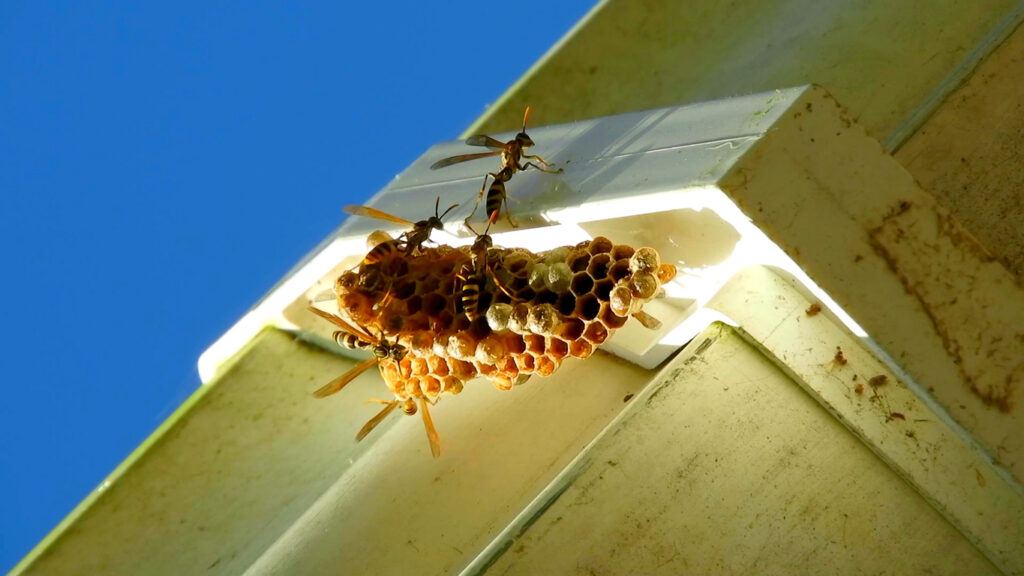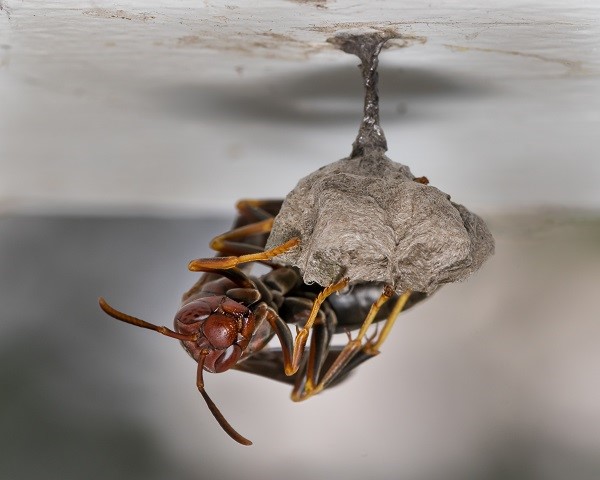ARE WASPS, BEES OR HORNETS TOO CLOSE FOR COMFORT?
Backyard BBQs, graduation and various other outdoor celebrations are in full swing. That means wafting odors of grilled meats and sweet drinks arousing appetites of all invited.
It could also mean some rather annoying and often scary uninvited intruders could put a damper on the celebration. Bees, wasps and hornets are notorious for smelling good times and doing their best to pester guests.
While wasps and hornets have many beneficial qualities, such as feeding off other unwanted insects, no one wants them around when they are angry and aggressive. Their painful stings can cause allergic reactions and even anaphylaxis in some people.
ARE YOU DEALING WITH WASPS OR BEES?
Wasps, yellow jackets and hornets nourish their larvae with insects, while bees feed theirs pollen. Hence, some farmers use wasps to protect crops. Both wasps and bees pollinate plants, but bees are super-pollinators.
Known to build nests in eaves, decking, garages and attic, wasps can invade your personal space and make life very uncomfortable. The goal is to make areas that are too close for comfort uncomfortable for them.
Both yellow jackets and hornets are a subset of the wasp family. Wasps, hornets and yellow jackets have a smooth skin and four wings. Wasps and yellow jackets have narrow waists, while a hornet is significantly larger and has a thicker waist.
Yellow jackets are by far the most aggressive. They will track a target and sting several times. Yellow jackets have bright yellow markings. Many confuse them with bees, which are fatter, have hair and not as bright in color. Bees can only sting once, as they lose their stinger and die.
Bees are the most placid of the stinging insect variety. Left alone and not aggravated, they go about their very important business of pollinating the world. Bees typically colonize in a hollow tree. However, they can also establish a hive in the cavity of a building, such as an attic or hollow walls.

HOW TO DEAL WITH A BEE COLONY
When this happens, it is time to call a professional who can help remove bee colonies and nests. Honeybees are a protected species and should be relocated, rather than annihilated when they present an issue.
Ignoring the issue will become a big problem, as mature hives can support twenty to eighty thousand bees weighing in at hundreds of pounds. Sometimes their hives are visible. However, most are not and the best indication of one is bees flying in and out of an exterior crack or opening.
DO NOT try to close up the entrance or interfere with them in any way – call a professional!
NATURAL WAYS TO DETER BEES
The smell of garlic repels bees. Sprinkle some garlic powder around areas of your yard from which you wish to deter them. Burning citronella candles may encourage bees to relocate. Another option is peppermint essential oil added to distilled water and sprayed in areas you would like to rid of bees.

HOW TO DEAL WITH NESTING WASPS
Wasps tend to rebuild where they were in previous years, so treat those spots before they build nests close to your patio or porch. A natural solution is to mix several drops of each; Clove, Geranium and Lemongrass Oil, with water and dish soap in a spray bottle. Spray the mixture to coat areas outside the home where they typically build nests – eaves, porch roofs, ledges and crevices.
Another possibility, after they begin to nest, is to mix 2 tablespoons of dish soap with water in a spray bottle and spray small hanging nests. The soap clogs their breathing pores and they die almost immediately.
There are wasp repellent sprays available, but they are not a complete solution. If you manage to spray the nest and eliminate a good portion of the colony, worker wasps – regardless whether they survive – emit pheromones that could linger for weeks. These scents could draw more wasps to the previous hive area.
Many of the chemicals in these readily available sprays are ineffective and if misused can be dangerous to people, pets and plants. Much like bees, wasps are vital to the ecosystem, so killing rather than preventing them from nesting too close for comfort is not good for the environment.
It is best to call a professional that can help prevent them from nesting in your personal space and encourage them to go somewhere else where they can do their necessary work from a distance.
SOME HELPFUL ARTICLES:
Controlling Cockroaches in the New York Metropolitan Area
How NOT to Invite Rodents into Your Home
WASPS, HORNETS & YELLOW JACETS … OH MY!
HOW TO GET RID OF ANTS
HOW TO TELL THE DIFFERENCE BETWEEN FLYING ANTS & TERMITES

The Bug Stops Here is a full service pest control and exterminator company serving Bohemia and Nassau County, New York and businesses located in Long Island, New York serving all of New York City; Brooklyn, Queens, Manhattan and surrounding area. For twenty years, our team at Pest Control team has been comprised of professional exterminators who provide high quality pest control services for both commercial and residential properties throughout New York. Our team of extermination professionals can get rid of a variety of pests, ranging from cockroaches, termites, ticks & fleas, bees, wasps,hornets, rodents, ants to bed bugs. Our goal is to provide you with the best pest control services that exceed both your standards and those of the industry as a whole.

